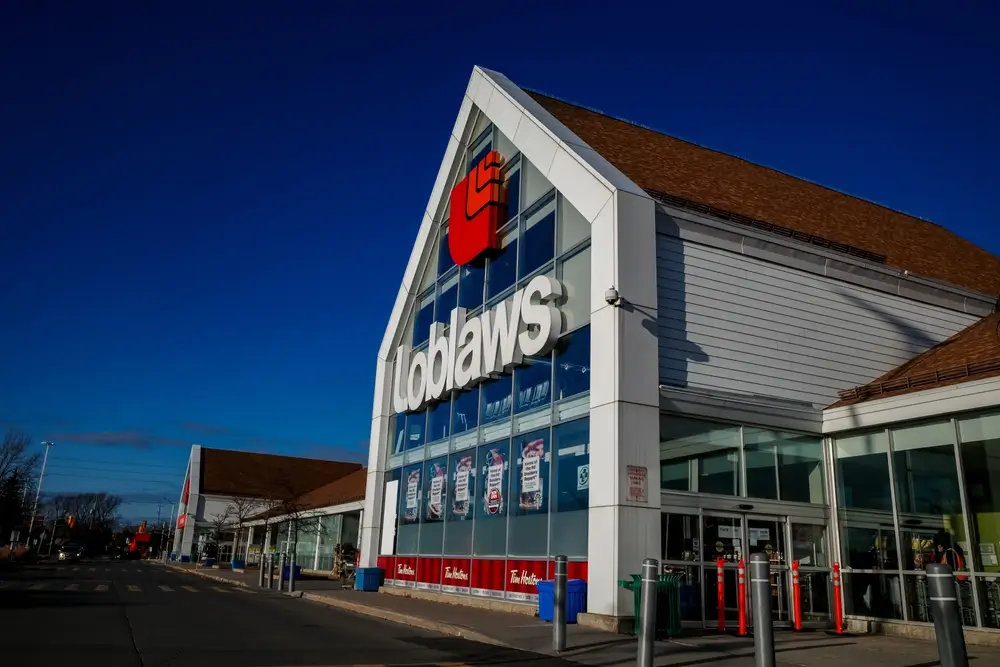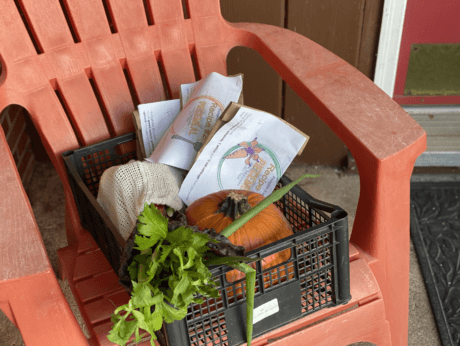$9 Butter? Canadian Redditors Say No Thank You
Subscribers to a Reddit thread organized a national boycott of grocery mega-chain Loblaws that grew into a community movement to promote farmer’s markets and local food.
$9 Butter? Canadian Redditors Say No Thank You
Subscribers to a Reddit thread organized a national boycott of grocery mega-chain Loblaws that grew into a community movement to promote farmer’s markets and local food.

by Shutterstock
“Virtually all of the products I buy on the regular have experienced some degree of shrinkflation…The practice is intentionally based on deceiving the customer. It’s unethical.”
“This is getting ridiculous! I just spent $370 on groceries and have barely any food… How are people supposed to survive like this? Why is having three meals a day a luxury now?”
“Since the boycott, I’ve spent some time analyzing what I spend and where, and I’ve realized I can go entirely without the big three: Loblaws, Sobeys or Metro. I haven’t stepped foot in any of their stores since and I don’t plan on ever doing it again.”
These are just a few of the thousands of comments that Canadian Redditors have left on the page “Loblaws Is Out of Control,” where members share stories of $9 butter or tubs of $28 feta (twice the price of a competitor). The page was started by an Ontario woman, Emily Johnson, in November, as a way to share frustrations about high grocery prices. It quickly attracted members, with more than 79,000 people joining up in a matter of months. And they had a lot to talk about. In February 2023, the Consumer Price Index noted that food prices were up more than 10 percent year over year, double the national rate of inflation. It was the seventh straight month of double-digit food price increases.
As more members joined the page, talk of a grocery store boycott began to intensify.

Canada’s grocery market is dominated by five main retailers, which make up 76 percent of the market. The country’s biggest grocery chain, Loblaws, has cornered 28 percent of the market entirely. The company runs multiple brands of grocery and pharmacy chains, has several in-house lines that it sells, including the President’s Choice and No Name brands, and has long been a source of ire for Canadians struggling with rising food prices. While general economic inflation and rises in the cost of living do account for some hikes in food prices, these Redditors allege that price hikes have more to do with corporate greed and lack of competition than anything else.
In addition to high costs, Loblaws has refused to sign a proposed Grocer Code of Conduct, saying that it worried that would lead to even higher prices on food. Loblaws has also struggled to regain public trust after its involvement in a bread price-fixing scandal over the 2010s. [Update: On May 16, the CEO of Loblaw Companies Limited told media they would sign the code of conduct as long as its grocery competitors did too.]
Frustrations reached a fever pitch; Loblaws was an obvious target for a boycott for many Canadians.
On May 1, Loblaws announced its 2024 first-quarter profits; they’re up nearly 10 percent over the same time last year. The same day, the boycott officially started, with tens of thousands of shoppers vowing to ignore Loblaws. In smaller communities, where Loblaws stores are the only option, thousands vowed to cut their purchases.
Boycotters are demanding that both Loblaws and Walmart agree to sign the code of conduct, as well as commit to price caps on essential items and no retailer-led price increases for the rest of the year.
Loblaws chairman Galen Weston told media that the boycott is an example of “misguided criticism.” Weston said that he understood the frustration, but that expectations that Loblaws would be able to dramatically drop prices “betrays a misunderstanding of what’s actually driving food prices higher in this country.” However, Redditors have posted their own examples of small victories, which they attribute to the boycott: offers of extra reward points, photos and videos of items with large markdowns and alleged conversations about falling sales numbers.
With a boycott underway, the Reddit thread has become a place for people to offer tips and help their neighbors—with many finding ways to highlight local food or farmer’s markets. One user created We Food Wise, a site to help shoppers compare grocery prices. Another shared the site AltGrocery, which promotes local and indie food sellers, as well as farmer’s markets and co-ops.
“The pandemic made us all acutely aware of food prices and shortages, prompting questions about the trustworthiness of local supermarkets and whether food prices are justifiably higher post-pandemic,” said the creator of AltGrocery, in an email. They have opted to remain anonymous, as they say they want the focus of the site to be the farmers and food producers.
So far, AltGrocery has received about 107,000 visitors, and it has even had to temporarily suspend the map feature due to high traffic. AltGrocery says it is updating the map functionality, so users can find local markets from their mobile phones. It is also working on introducing filter systems, which will allow people to sort food by price. It has also brought in about $800 in donations to put towards site upkeep. “I plan to keep running beyond any boycotts. I think, if anything, [the site has] educated people to second guess where they get their food from and how much something is being sold for.”

Local markets have seen a boom in sales already. Edmonton-based Forage Market, an online farmer’s market, saw a 37-percent boost in website traffic since the boycott began, leaving them cautiously optimistic. “The first day of the boycott, we were up 27 percent. That’s great, we’ll take that. And then the next day, we were up 175 percent,” says Courtney Hanak, business development manager for the market. “The support is always appreciated. But we’re definitely trying to think about how we can make this last. How can we show consumers that this is an option year round?”
Hanak and her business partner started the market during COVID, when empty grocery shelves were a norm. “We started asking ourselves, why aren’t we buying locally? I’m seeing empty grocery shelves, but I know that the farmer down the road grows [these products].” They found that traditional farmer’s markets weren’t always accessible, either by location or hours, so they opted for an online warehouse model. Customers can go on the website to select products from individual farmers, just like stalls at a farmer’s market, but Forage will package and ship them out together.
Hanak says she’s happy to see people getting more acquainted with farmer’s markets and local food. “There’s still this myth that people assume the farmer’s markets will be more expensive. But with inflation and the grocery prices and where they’re at now, it’s not… We’ve done cost comparisons, and we end up beating the average grocery cart total by about $2.”

And many shoppers are happy to pay prices on par with grocery stores if they know where that money is going. “If you pay a farmer…then they’re going to take that dollar, and they’re going to spend it on a local hairdresser, they’re going to spend it at the local cafe, they’re going to spend it on items that are also provided locally. So, we are feeding our own economy rather than funneling our money to millionaires and billionaires,” says Kara Friesen, owner of PieceMeal, a Nova Scotia-based meal kit. Friesen works with local farmers to collect in-season produce, then puts together weekly meal kits, with recipes and instructions so people can easily throw meals together. When she heard of the boycott, she created the Loblaws Boycott promotion, offering a discount for new signups in the last two weeks of May.
Friesen is supportive of the boycott, but she recognizes that it’s not easy for everyone. “It is often hard for people to access food outside of the grocery stores, because these retailers are highly competitive and can sell food for less than it’s actually worth, because of things like the retail fees that they charge suppliers,” says Friesen. She recommends figuring out what you are able to purchase locally, with fresh produce at the top of the list. Then, make a meal plan around what’s available, and purchase only what you have to from bigger stores.
“I’ve devoted a lot of time to researching our food systems and how it affects every aspect of our lives,” says Friesen.”When I saw the boycott, I just sort of breathed a sigh of relief and thought this is really something that could gain traction and maybe help educate the public a little bit more about how important it is to understand the food system.”
Many in the Reddit community have spoken about expanding the boycott past May or to include other stores. The creator of AltGrocery also told Modern Farmer they would be interested in expanding their site to include the US, as mergers and consolidation have also resulted in high food prices further south.
Emily Johnson, the creator of the Reddit page, has met with officials from Loblaw to talk about the demands of the boycott. She’s also started a petition with Canada’s House of Commons to ask for stronger anti-trust laws and investigate the pricing structure of large grocery stores. The petition has nearly 7,000 signatures so far.
Update: On May 16, Lobaw CEO Per Bank told media that the company was ready to sign on to the Grocery Code of Conduct, provided that other grocers also sign.
Follow us
This work is licensed under a Creative Commons Attribution-NoDerivatives 4.0 International License.
Want to republish a Modern Farmer story?
We are happy for Modern Farmer stories to be shared, and encourage you to republish our articles for your audience. When doing so, we ask that you follow these guidelines:
Please credit us and our writers
For the author byline, please use “Author Name, Modern Farmer.” At the top of our stories, if on the web, please include this text and link: “This story was originally published by Modern Farmer.”
Please make sure to include a link back to either our home page or the article URL.
At the bottom of the story, please include the following text:
“Modern Farmer is a nonprofit initiative dedicated to raising awareness and catalyzing action at the intersection of food, agriculture, and society. Read more at <link>Modern Farmer</link>.”
Use our widget
We’d like to be able to track our stories, so we ask that if you republish our content, you do so using our widget (located on the left hand side of the article). The HTML code has a built-in tracker that tells us the data and domain where the story was published, as well as view counts.
Check the image requirements
It’s your responsibility to confirm you're licensed to republish images in our articles. Some images, such as those from commercial providers, don't allow their images to be republished without permission or payment. Copyright terms are generally listed in the image caption and attribution. You are welcome to omit our images or substitute with your own. Charts and interactive graphics follow the same rules.
Don’t change too much. Or, ask us first.
Articles must be republished in their entirety. It’s okay to change references to time (“today” to “yesterday”) or location (“Iowa City, IA” to “here”). But please keep everything else the same.
If you feel strongly that a more material edit needs to be made, get in touch with us at [email protected]. We’re happy to discuss it with the original author, but we must have prior approval for changes before publication.
Special cases
Extracts. You may run the first few lines or paragraphs of the article and then say: “Read the full article at Modern Farmer” with a link back to the original article.
Quotes. You may quote authors provided you include a link back to the article URL.
Translations. These require writer approval. To inquire about translation of a Modern Farmer article, contact us at [email protected]
Signed consent / copyright release forms. These are not required, provided you are following these guidelines.
Print. Articles can be republished in print under these same rules, with the exception that you do not need to include the links.
Tag us
When sharing the story on social media, please tag us using the following: - Twitter (@ModFarm) - Facebook (@ModernFarmerMedia) - Instagram (@modfarm)
Use our content respectfully
Modern Farmer is a nonprofit and as such we share our content for free and in good faith in order to reach new audiences. Respectfully,
No selling ads against our stories. It’s okay to put our stories on pages with ads.
Don’t republish our material wholesale, or automatically; you need to select stories to be republished individually.
You have no rights to sell, license, syndicate, or otherwise represent yourself as the authorized owner of our material to any third parties. This means that you cannot actively publish or submit our work for syndication to third party platforms or apps like Apple News or Google News. We understand that publishers cannot fully control when certain third parties automatically summarize or crawl content from publishers’ own sites.
Keep in touch
We want to hear from you if you love Modern Farmer content, have a collaboration idea, or anything else to share. As a nonprofit outlet, we work in service of our community and are always open to comments, feedback, and ideas. Contact us at [email protected].by Emily Baron Cadloff, Modern Farmer
May 16, 2024
Modern Farmer Weekly
Solutions Hub
Innovations, ideas and inspiration. Actionable solutions for a resilient food system.
ExploreShare With Us
We want to hear from Modern Farmer readers who have thoughtful commentary, actionable solutions, or helpful ideas to share.
SubmitNecessary cookies are absolutely essential for the website to function properly. This category only includes cookies that ensures basic functionalities and security features of the website. These cookies do not store any personal information.
Any cookies that may not be particularly necessary for the website to function and are used specifically to collect user personal data via analytics, ads, other embedded contents are termed as non-necessary cookies.
The big stores will get the government to go after farm markets and the farmers for food safety reasons.
Yes Please! says I